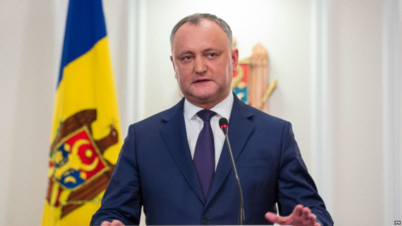
Moldovan President Igor Dodon may be all in favour of closer ties to Russia, but many of his countrymen, including the leadership in Sadovo, his hometown, have their hearts set on embracing an altogether different “motherland” — Romania.
Sadovo is one of 108 municipalities, mostly villages, that have expressed an interest in reuniting with their southwestern neighbour. The latest to sign the so-called declaration on reunification is the village of Malkoch, in the Yalovensky region.
“With a view to restore the historical right to live together with brothers on the opposite bank of the Prut River we declare immediate and unconditional unification with Motherland Romania,” reads the document that elected members of the Malkoch village council signed in late March.
Three regional councils — in Strashensky, Kalarashsky and Teleneshtsky — have signed similar declarations, and on March 10, more than 100 Moldovan mayors and village council members participated in a conference in Iasi, Romania’s second largest city, where together with local Romanian representatives they adopted a resolution on the unification of two countries.
It’s no coincidence that the unification push is taking place during an election year. President Dodon, a proponent of rapprochement with Russia, opposes the movement, while the government, led by Prime Minister Pavel Filip, is decidedly pro-Europe and pro-Romania. Analysts say the debate has the potential to benefit both sides, with parliamentary elections set to take place next autumn.
The reunification campaign, with its various declaration signings, is being led by the National Unity Bloc (BNU), which includes Moldovan and Romanian organisations striving for “restoration of historical justice.” The BNU’s initial aim was to get 100 of Moldova’s nearly 900 municipalities to sign reunification declarations, but it has already surpassed that mark. The number 100 holds a lot of symbolic value for unionists, who just celebrated the centennial of Bessarabia’s unification with Romania on March 27, 1918.
President Dodon and his backers in the Party of Socialists launched their own campaign as a counterbalance to the unionist one, and on March 7, Dodon organised a security council meeting to denounce the adoption of pro-Romanian declarations. “The council considers that these actions represent a serious violation of the provisions of the constitution,” Dodon said. “We suggest changing the criminal code to make such actions criminally liable.”
The Moldovan president has long been trying to forbid the activities of unionist organisations in the country, but has so far been unsuccessful. The majority of the seats in Parliament belong to the Democratic Party, which supports integration into the EU and has taken a hands-off approach to the unionist campaign.
Vladislav Kulminsky, the deputy director of Kishinev’s Institute of Strategic Initiatives, warns that the Democratic Party is quietly sanctioning the movement. “Without the encouragement on the part of the authorities, the adoption of the declaration on reunification with Romania would have been impossible,” he told Kommersant.
But the unionist campaign is also “a wonderful gift for the socialists,” Kulminsky added. “They can sing and dance about the dangers of unionism and take the voters’ attention away from real problems.”
Kulminsky also said that as important as reintegration with Romania is to a certain segment of voters in Moldova, the majority still supports independence and sovereignty. Nor do people see it as a real possibility given that none of the major powers involved — Russia, the EU and the US — has any expressed interest in supporting unification, the expert added.
Historian Mark Tkachuk, a former lawmaker in Moldova, doesn’t believe the current push for unification is driven by ideology. Nor is it based on some kind of nostalgia for Romania’s interwar glory days, he told Kommersant. It’s a reflection instead of people’s frustrations with the powers that be in Moldova, of their sense that “100 politicians seized power and won’t relinquish it,” he said.
“Unionism is disbelief in changes for the better, distrust in their own state institutes,” Tkachuk added. “This is pragmatic unionism of people in despair.”
— Worldcrunch, 2018/New York Times News Service










